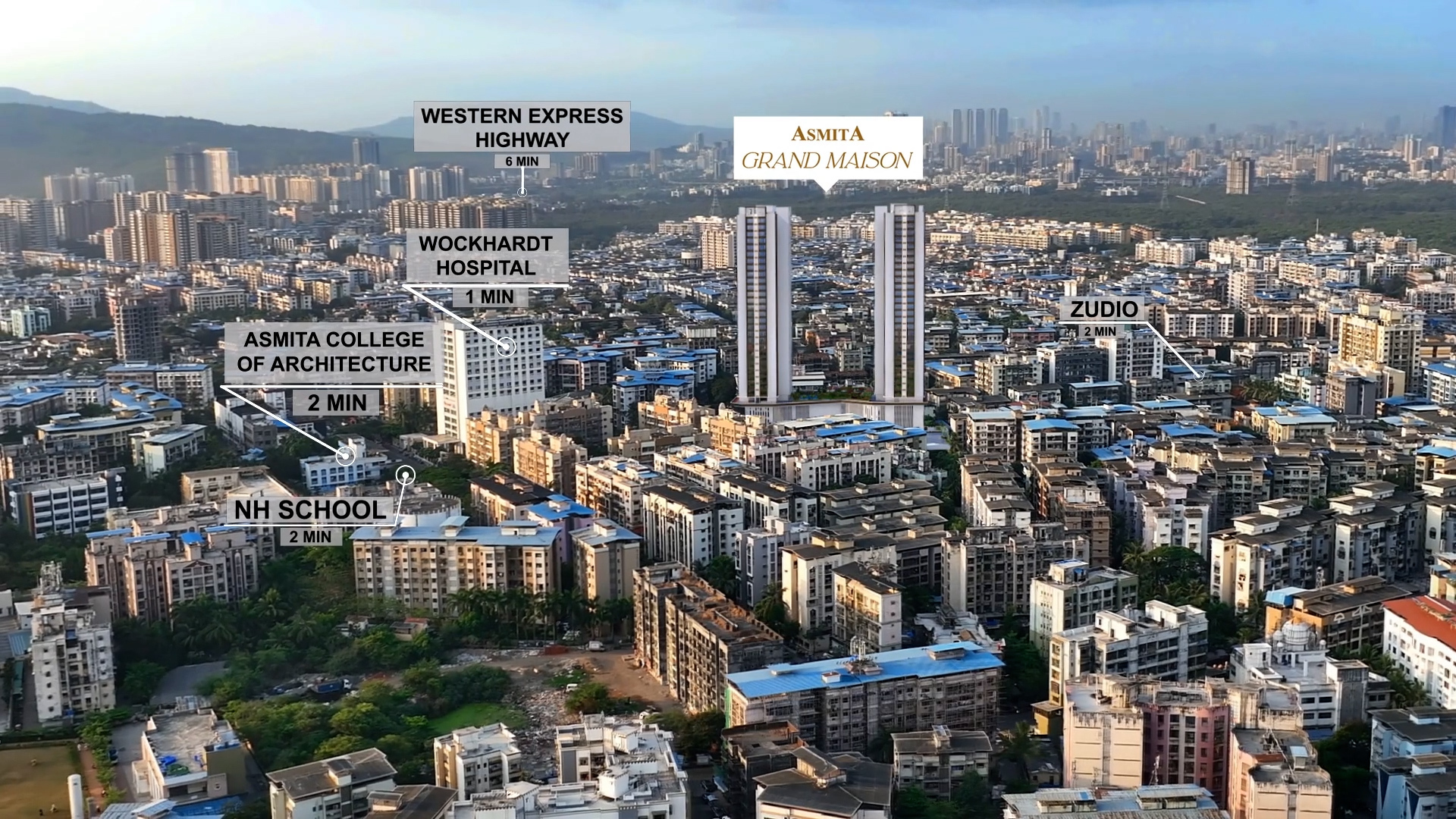- Home
- »
- All Projects
- »
- Redevelopment
Redevelopment
Let us Help You Redevelop
Transforming the Homes You Love — for the Future You Deserve
Residential Redevelopment in Mumbai
In a city that’s constantly evolving, we believe your home should evolve too. At AsmitA India Realty, we bring decades of experience in premium residential development to the next frontier — society redevelopment. Our goal is simple: to help residents upgrade their living standards without leaving the neighbourhoods they’ve built their lives in.
We approach redevelopment as more than construction — it’s about revitalising communities with thoughtful design, cutting-edge amenities, improved safety, and enduring quality. With our strong legacy in creating modern, sustainable homes across Mumbai, our expert team is fully equipped to ensure a smooth, transparent, and rewarding redevelopment journey — from proposal to possession.
Every society has its story. We’re here to help you reimagine yours — with a home that reflects your aspirations and stands the test of time.
OUR COMMITMENT
At AsmitA India Realty, we specialize in the art of maximizing the potential of existing land areas to draw in prospective residents, investors, and businesses.

TIMELY DELIVERY

SIGNATURE QUALITY

100% TRANSPARENCY
WHY YOU SHOULD CHOOSE US?
HISTORY OF SUCCESS
Since 1985, we have spearheaded community transformation, enhancing infrastructure, education, and healthcare.
LOYAL CUSTOMER BASE & COMMUNITY
Our portfolio boasts 50 thriving residential developments and over 200 successful commercial projects.
AWARD-WINNING REPUTATION
Recipient of the Smart Real Estate Project award (2022) from CNBC Awaaz & Best Realty Brands (2024 & 2025) by ET Edge Times Group.

REDEVELOPMENT PROCESS GUIDE
Empowering your society’s transformation is not only simpler but also the wisest investment for financial security and the future. AsmitA India Realty, a top-rated redevelopment partner in Mumbai, is committed to ensuring a smooth and stress-free process. Explore our user-friendly guide for navigating your society’s redevelopment journey with ease.
The society begins the redevelopment process by issuing a public notice/invitation for redevelopment proposals in accordance with the redevelopment guidelines issued under Section 79(A) of the Maharashtra Co-operative Societies Act, 1960. AsmitA India Realty submits detailed offers covering:
i. Proposed carpet area and tentative flat layouts
ii. Transit rent or alternate accommodation provisions
iii. Corpus fund, amenities, and specifications
iv. Construction schedule, milestones, and payment terms
The society shall appoint an independent Project Management Consultant (PMC) and a Legal Advisor through a formal resolution. They assist the committee in:
i. Assessing technical feasibility and planning parameters as per the applicable UDCPR provisions for redevelopment.
ii. Verifying financial capability and track record of bidders
iii. Comparing offers through a transparent comparative statement
The comparative report is presented to members in a Special General Body Meeting (SGBM) for deliberation and shortlisting of the preferred developer.
Following detailed discussion, the society passes a redevelopment resolution by a minimum 75 % majority of total members (as per GR dated 04.07.2019).
Each member then provides irrevocable written consent in the prescribed format confirming acceptance of the redevelopment proposal. This collective consent authorises the society to execute the Development Agreement.
A registered Development Agreement is executed between the society and AsmitA India Realty, specifying: i. Commercial terms (carpet area, corpus, rent, amenities)
ii. Construction milestones & delivery timelines
iii. Legal rights, indemnities, and dispute-resolution clauses
Architectural plans are prepared and submitted to MBMC for scrutiny. On compliance with planning norms, MBMC issues an Intimation of Disapproval (IOD) — listing pre-construction conditions.
After receipt of IOD, Permanent Alternate Accommodation Agreements are executed and registered individually with each member. These agreements legally secure:
i. The member’s entitlement to a new flat and carpet area
ii. The assured transit rent or alternate accommodation
iii. The developer’s contractual obligations and timelines
Once all members vacate and possession is handed over, the old structure is demolished safely under statutory supervision.
MBMC issues a Commencement Certificate (CC) permitting construction as per the approved plans and IOD conditions.
Necessary NOCs (Fire, Environmental, etc.) are obtained before starting actual work.
Construction proceeds under MBMC’s continuous monitoring and periodic inspection by the PMC and structural consultant.
After completion and compliance with all norms (fire, drainage, structural, and environmental), MBMC issues the Occupation Certificate (OC) confirming the building is fit for occupation.
With the OC granted, AsmitA India Realty hands over the new, legally compliant flats to society members and new allottees. Within 4 to 6 months, a new co-operative housing society (or reconstituted society) is registered.
All project documents — sanctioned plans, approvals, warranties, and conveyance deeds are transferred to the newly elected managing committee.
Disclaimer:This guide is for general informational purposes only and outlines the typical redevelopment process within the MBMC jurisdiction. It is not intended to constitute legal, technical, or professional advice. Societies, members, and developers should consult their own legal, architectural, and other professional advisors for project-specific guidance. AsmitA India Realty assumes no responsibility for any errors, omissions, or actions taken based on this information.
Frequently Asked Questions
The vetting process requires key legal and property documents to verify ownership and eligibility for redevelopment. These include:
- Society Documents:
- Society Registration Certificate
- Conveyance / Lease / Sale Deed
- Property Card and 7/12 Extract
- City Survey or Demarcation Plan
- NA Order (if applicable)
- Index II and Approved Building Plan
- Property and Water Tax Bills
- Member List with Flat Numbers
- Member Documents:
- Proof of stamp duty and registration paid
- Share Certificate
- Sale Deed / Allotment Letter / Agreement to Sell
- Proof of ownership and existing flat area
In Mira Bhayandar, most projects come under Society Redevelopment, approved by the MBMC under UDCPR guidelines.
MHADA Redevelopment applies only to buildings on MHADA-owned or leased land, where MHADA is the approving authority — though such cases are rare in this region.
Yes. Homebuyers are protected under the Real Estate (Regulation and Development) Act, 2016 (RERA), which ensures transparency and accountability in all real estate and redevelopment projects.
Under MahaRERA, developers must register their projects, adhere to approved plans, and meet possession timelines. Buyers can file complaints directly with MahaRERA for quick resolution. This law safeguards every stage of the redevelopment process — from agreement to delivery — ensuring that buyers’ rights and investments remain secure.
Redevelopment typically follows these structured stages to ensure transparency and legal compliance:
- Feasibility & Approval: A certified structural engineer inspects the building. Members approve redevelopment in a General Body Meeting (GBM) with minimum 51% consent.
- Appointing Experts: The society forms a Redevelopment Committee and appoints an Architect, Legal Advisor, and Project Management Consultant (PMC).
- Developer Selection: Proposals are invited from reputed developers. The final developer is approved in a GBM with at least 70% member consent, following comparative evaluation.
- Plan Sanctions & Approvals: The selected developer obtains approvals from MBMC. A Commencement Certificate (CC) is issued before construction begins.
- Construction & Handover: Members temporarily relocate while the old structure is redeveloped. After completion and inspection, MBMC issues an Occupation Certificate (OC), and new flats are handed over to members.
Any housing society or building over 30 years old, or one that has a structural audit report recommending redevelopment, can begin the process.
Redevelopment is most suitable for societies dealing with issues like poor maintenance, lack of parking, outdated amenities, or safety concerns.
To proceed, the proposal must be approved by at least 51% of society members through a resolution passed in a General Body Meeting (GBM).
In a redevelopment project, the developer pays all statutory payments, including stamp duty, registration, and government fees related to the redevelopment area.
However, any outstanding dues of existing members must be settled by the members themselves. If a member chooses to purchase additional area beyond what is allotted, all related charges — such as Stamp Duty, Registration, and GST — are to be borne by that member.
Selecting the right developer is crucial for a successful project. Societies should evaluate:
- Financial Stability: Ensure the developer has the financial capacity to complete the project on time.
- Track Record: Review their past redevelopment or real estate projects for quality and reliability.
- Quality of Offer: Compare the carpet area, corpus, amenities, and rent offered.
- Professional Approach: Assess transparency, communication, and willingness to address members’ concerns.
Choosing a developer with a strong reputation and proven delivery record ensures a smooth and secure redevelopment journey.
Not necessarily. Every redevelopment project is evaluated differently based on its feasibility and site conditions.
Factors such as the existing building’s utilisation, plot size, road access, and even requirements like road widening can influence the offer. As a result, the terms, area, and benefits may vary from one society to another — even if they’re located nearby.
Transparency is key to a successful redevelopment. All terms and conditions should be clearly documented in writing, leaving no room for verbal agreements.
The society must also ensure that every stage of the process follows legal compliance, with regular updates shared with all members. Any form of misconduct, rule violation, or unauthorised change should be strictly avoided to protect the interests of all residents.

